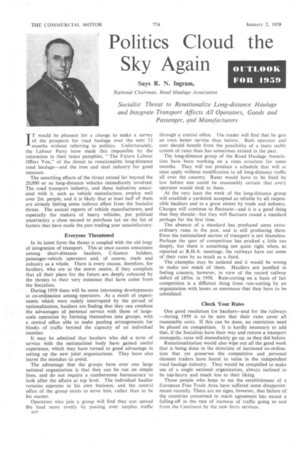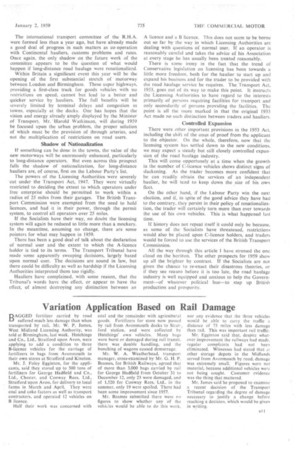Politics Cloud the Sky Again
Page 44

Page 45

If you've noticed an error in this article please click here to report it so we can fix it.
Says R. N. Ingram,
National Chairman, Road Haulage Association
Socialist Threat to Renationalize Long-distance Haulage and Integrate Transport Affects All Operators, Goods and Passenger, and Manufacturers
IT would be pleasant for a change to make a survey of the prospects for road haulage over the next 12 months without referring to politics. Unfortunately, the Labour Party have made this impossible by the reiteration in their latest pamphlet, "The Future Labour Offers You," of the threat to renationalize long-distance road haulage—and the iron and steel industry for good
measure. .
The unsettling effects of the threat extend far beyond the 20,000 or so long-distance vehicles immediately involved. The road transport industry, and those industries associated with it, such as vehicle manufacture, employ well over 2m. people, and it is likely that at least half of them are already feeling some indirect effect from the Socialist threat. The annual reports of vehicle manufacturers, and especially the makers of heavy vehicles, put political uncertainty a close second to purchase tax on the list of factors that have made the, past trading year unsatisfactory.
Everyone Threatened
In its latest form the threat is coupled with the old bogy of integration of transport. This at once causes uneasiness among short-distance hauliers, C-licence holders, passenger-vehicle operators and, of course, trade and industry as a whole. There is every excuse, therefore, for hauliers, who are at the storm centre, if they complain that all their plans for the future are deeply coloured by the threats to their very existence that have come from the Socialists.
During 1959 there will be some interesting developments in co-ordination among operators. As a result of experiments which were rudely interrupted by the period of nationalization, hauliers are finding that they can combine the advantages of personal service with those of largescale operation by forming themselves into groups, with a central office able to make pooling arrangements for blocks of traffic beyond the capacity of an individual member.
It may be admitted that hauliers who did a term of service with the nationalized body have gained useful experience, which they have turned to good advantage in setting up the new ,joint organizations. They have also learnt the mistakes to avoid.
The advantage that the groups have over one large national organization is that they can be run on simple lines, and do not require a cumbersome bureaucracy to look after the affairs at top level. The individual haulier remains supreme in his own business, and the central office of the group exists to serve him, rather than to be his master.
Operators who join a group will find they can spread the load more evenly by passing over surplus traffic through a central office. The trader will find that he gets an even _better service than before. Both operator and user should benefit from the possibility of a more stable system of rates than has sometimes existed in the past.
The long-distance group of the Road Haulage Association have been working on a rates structure for some months. They will not produce a schedule that will at once apply without modification to all long-distance traffic all over the country. Rates would have to be fixed by law before one could be reasonably certain that. every operator would stick to them.
At the very least the work of the long-distance group will establish a yardstick accepted as reliable by all responsible hauliers and to a great extent by trade and industry. Charges will continue to fluctuate—and it is a good thing that they should—but they will .fluctuate round a standard perhaps for the first time.
The absence of a standard has produced some extraordinary rates in the past, and is still producing them. Even the nationalized section of transport is not blameless. Perhaps the spur of competition has pricked a little too deeply, but there is something not quite right when, as reported at R.H.A. meetings, the railways have cut some of their rates by as much as a third.
The examples may be isolated and it would be wrong to make too much of them. Hauliers are justified in feeling concern, however, in view of the record railway deficit of £85m. in 1958. Rate-cutting on a basis of fair competition is a different thing from rate-cutting by an organization with losses so enormous that they have to be subsidized.
Cheek Your Rates
One good resolution for hauliers—and for the railways —during 1959 is to be sure that their rates cover all reasonable costs. If this can be done, no restriction need be placed on competition. It is hardly necessary to add that, if the Socialists have their way and restore a transport monopoly, rates will immediately go up, as they did before.
Renationalization would also wipe out all the good work that is being done in the direction of increased co-ordination that yet preserves the competitive and personal element traders have learnt to value in the independent road haulage industry. They would be compelled to make use of a single national organization, always inclined to be top-heavy and much less to their liking.
Those people who hope to see the establishment of a European Free Trade Area have suffered some disappointments recently. There are no signs, however, that failure of the countries concerned to reach agreement has meant a falling-off in the rate of increase of traffic going to and from the Continent by the new ferry services. The international transport committee of the R.H.A. were formed less than a year ago, but have already made a good deal of progress in such matters as co-operation with Continental hauliers, customs problems and rates. Once again, the only shadow on the future work of the committee appears to be the question of what would happen if long-distance road haulage were renationalized.
Within Britain a significant event this year will be the opening of the first substantial stretch of • motorway between London and Birmingham. These super highways, providing a first-class track for goods vehicles with no restrictions on speed; cannot but lead to a better and quicker service by hauliers. The full benefits will be severely limited by terminal delays and congestion m towns, especially at the docks. One has hopes that the vision and energy already amply displayed by the Minister of Transport, Mr. 'Harold Watkinson, will during 1959 be focused upon the urban problem, the proper solution of which must be the provision of through arteries, and not the multiplication of restrictions on road users.
Shadow of Nationalization
If something can be done in the towns, the value of the new motorways will be enormously enhanced, particularly to long-distance operators. But even across this prospect falls the shadow of nationalization, for long-distance hauliers are, of course, first on the Labour Party's list.
The powers of the Licensing Authorities were severely -cut under the Transport Act, 1947. They were virtually restricted to deciding the extent to which operators under free enterprise should be permitted to work within a radius of 25 miles from their garages. The British Transport Commission were exempted from the need to hold licences, and had it in their power, through the permit system, to control all operators over 25 miles.
If the Socialists have their way, no doubt the licensing system will again be reduced to little more than a mockery. In the meantime, assuming no change, there are some pointers for what may happen in 1959.
There has been a good deal of talk about the declaration of .normal user and the extent to which the A-licence holder is tied to its terms. The Transport Tribunal have made some apparently sweeping decisions, largely based upon normal user. The decisions are sound in law, but there could be difficulty as well as hardship if the Licensing Authorities interpreted them too rigidly.
Hauliers have complained, with some reason, that the Tribunal's words have the effect, or appear to have the effect, of almost destroying any distinction between an
.A licence and a B licence_ This does not seem to be borne out so far by the way in which Licensing Authorities are dealing with questions of normal user. If an operator is reasonably careful and takes the advice of his Association at every stage he has usually been treated reasonably.
There is some irony in the fact that the trend of Conservative legislation on licensing has been towards a little more freedom, both for the haulier to start up and expand his business and for the trader to be provided with the road haulage service he requires. The Transport Act, 1953, goes out of its way to make this point. It instructs the Licensing Authorities to have regard to the interests primarily of persons requiring facilities for transport and only secondarily of persons providing the facilities. The point is all the more marked in that the original 1933 Act made no such distinction between traders and hauliers.
Controlled Expansion
There were other important provisions in the 1953 Act, including the shift of the onus of proof from the applicant to the objector. On the whole, therefore, now that the licensing system has settled down to the new conditions, we may expect a steady but still closely controlled expansion of the road haulage industry.
This will come opportunely at a time when the growth in the number of C-licence vehicles shows distinct signs of slackening. As the trader becomes more confident that he can readily obtain the services of an independent haulier, he will tend to keep down the size of his own fleet.
On the other hand, if the Labour Party win the next election, and if, in spite of the good advice they have had to the contrary, they persist in their policy of renationalization, the trader will certainly turn more than ever towards the use of his own vehicles. This is what happened last time.
If history does not repeat itself it could only be because, as some of the Socialists have threatened, restrictions would also be placed upon C-licence holders, and traders would be forced to use the services of the British Transport Commission.
All the way through this article I have stressed the one cloud on the horizon. The other prospects for 1959 show up all the brighter by contrast. If the Socialists are not given the chance to re-enact their disastrous theories, or if they see reason before it is too late, the road haulage industry is well equipped and anxious to help the Government—of whatever political hue—to step up British production and prosperity.




































































































